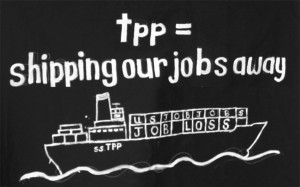by EDWARD S. HERMAN

It has been interesting to see how President Obama and even the leading Republicans have come to accept that inequality is perhaps excessive and needs to be addressed. The President has followed this through by proposing modest tax increases on the rich, modest public investments in education and infrastructure, a small increase in the rate of pay of military personnel and federal workers, and a small sum for trade displacement assistance. The Republicans will rely on freedom from Obama’s oppressive rule, along with their longstanding faith in trickle-down economics.
Some cynics have explained Obama’s modest boldness in this dangerous terrain on the basis of its sure failure of implementation given the Republican majorities in House and Senate. But it is also interesting that the Trans-Pacific Partnership (TPP) agreement that Obama has been pushing hard, for which he seeks fast-track approval (with no on-the-floor debate or amendments), would have a significant negative effect on equality, offsetting any positives based on the (unlikely) enactment of his pro-equality proposals.
The TPP would encourage further out-sourcing and job and tax revenue loss, a further weakening of labor’s bargaining power, windfalls for the wealthy from enhanced copyright and patent protection, along with reduced government revenue for social spending. This is a rerun of the 1993-1995 experience with NAFTA, where Bill Clinton ran roughshod over his popular base and Democratic majority in order to serve corporate interests, with measurably negative effects on jobs, wages and income equality. (See Jeff Faux, “NAFTA at 20: State of the American Worker,” Foreign Policy in Focus, December 13, 2013.) The mainstream media then and now have backed the job-killing and inequality increasing “economic freedom” agenda and, while the Republicans will not permit passage of Obama’s explicitly anti-inequality proposals, many of them will join with him in this program that a large segment of the business elite supports.
It should be noted that TPP, like NAFTA, focuses heavily on investors’ (i.e., corporate) rights, not reducing tariffs; only 4 of its 29 chapters deal with trade. But free trade sounds much more virtuous than “investors rights,” so for PR and the mainstream media it is a “free trade agreement.” (See Mark Weisbrot, “The Trans-Pacific Partnership Treaty is the Complete Opposite of ‘Free Trade’,” Guardian, November 19, 2013.) It is also notable how the Obama administration has tried to avoid any democratic input into the formulation of this agreement. Mr. Transparency has once again outdone himself in reducing transparency and trying to jam through an agreement that will threaten and damage public rights without public knowledge or debate, formulated in secret mainly in collaboration with corporate representatives. Fortunately for the public interest and democracy there is that traitorous creature Julian Assange whose organization WikiLeaks tapped into the secret negotiations and on November 13, 2013, released a 95-page draft text of a proposed chapter on “Intellectual Property Rights.” Quoting from the Wiki-Leaks release: “That 30,000-word IP Chapter lays out provisions for instituting a far-reaching, transnational legal and enforcement regime, modifying or replacing existing laws in TPP member states. The Chapter’s subsections include agreements relating to patents (who may produce goods or drugs), copyrights (who may transmit information), trademarks (who may describe information or goods as authentic) and industrial design.
Z Communications for more